Do anybody have an Idea of how to archive many to many in Scala Query?
I want to connect a blog post to a series of tags.
This is my database design:

I have succeeded with my custom code but when inspecting Scala Querys generated SQL I'm not happy with my solution.
I played with a functional approach and it generated many SQL queries resulting in a lot of round trips.
I can figure out how to reduce the number of queries by approximately half.
A hand crafted Query that fetches all my data nicely formatted in one Query,
select
p.id, p.content, p.posted_date, GROUP_CONCAT(t.name)
from
post p,
tag t,
tag_post tp
where
tp.post_id = p.id and tp.tag_id = t.id
group by
p.id
The generated queries from Scala Query giving the same data.
SELECT `t1`.`id`,`t1`.`content`,`t1`.`posted_date` FROM `post` `t1`
SELECT `t1`.`tag_id` FROM `tag_post` `t1` WHERE (`t1`.`post_id`=1)
SELECT `t1`.`id`,`t1`.`name` FROM `tag` `t1` WHERE (`t1`.`id`=1)
SELECT `t1`.`id`,`t1`.`name` FROM `tag` `t1` WHERE (`t1`.`id`=2)
SELECT `t1`.`id`,`t1`.`name` FROM `tag` `t1` WHERE (`t1`.`id`=3)
SELECT `t1`.`tag_id` FROM `tag_post` `t1` WHERE (`t1`.`post_id`=2)
SELECT `t1`.`id`,`t1`.`name` FROM `tag` `t1` WHERE (`t1`.`id`=1)
SELECT `t1`.`id`,`t1`.`name` FROM `tag` `t1` WHERE (`t1`.`id`=1)
SELECT `t1`.`id`,`t1`.`name` FROM `tag` `t1` WHERE (`t1`.`id`=2)
SELECT `t1`.`id`,`t1`.`name` FROM `tag` `t1` WHERE (`t1`.`id`=3)
SELECT `t1`.`tag_id` FROM `tag_post` `t1` WHERE (`t1`.`post_id`=3)
SELECT `t1`.`id`,`t1`.`name` FROM `tag` `t1` WHERE (`t1`.`id`=1)
SELECT `t1`.`id`,`t1`.`name` FROM `tag` `t1` WHERE (`t1`.`id`=2)
SELECT `t1`.`id`,`t1`.`name` FROM `tag` `t1` WHERE (`t1`.`id`=3)
SELECT `t1`.`tag_id` FROM `tag_post` `t1` WHERE (`t1`.`post_id`=4)
SELECT `t1`.`id`,`t1`.`name` FROM `tag` `t1` WHERE (`t1`.`id`=1)
SELECT `t1`.`id`,`t1`.`name` FROM `tag` `t1` WHERE (`t1`.`id`=2)
SELECT `t1`.`id`,`t1`.`name` FROM `tag` `t1` WHERE (`t1`.`id`=3)
SELECT `t1`.`tag_id` FROM `tag_post` `t1` WHERE (`t1`.`post_id`=5)
SELECT `t1`.`id`,`t1`.`name` FROM `tag` `t1` WHERE (`t1`.`id`=3)
SELECT `t1`.`id`,`t1`.`name` FROM `tag` `t1` WHERE (`t1`.`id`=1)
SELECT `t1`.`id`,`t1`.`name` FROM `tag` `t1` WHERE (`t1`.`id`=2)
SELECT `t1`.`tag_id` FROM `tag_post` `t1` WHERE (`t1`.`post_id`=6)
SELECT `t1`.`id`,`t1`.`name` FROM `tag` `t1` WHERE (`t1`.`id`=1)
SELECT `t1`.`id`,`t1`.`name` FROM `tag` `t1` WHERE (`t1`.`id`=2)
SELECT `t1`.`tag_id` FROM `tag_post` `t1` WHERE (`t1`.`post_id`=7)
SELECT `t1`.`id`,`t1`.`name` FROM `tag` `t1` WHERE (`t1`.`id`=3)
SELECT `t1`.`id`,`t1`.`name` FROM `tag` `t1` WHERE (`t1`.`id`=1)
SELECT `t1`.`id`,`t1`.`name` FROM `tag` `t1` WHERE (`t1`.`id`=2)
SELECT `t1`.`tag_id` FROM `tag_post` `t1` WHERE (`t1`.`post_id`=8)
SELECT `t1`.`id`,`t1`.`name` FROM `tag` `t1` WHERE (`t1`.`id`=3)
SELECT `t1`.`tag_id` FROM `tag_post` `t1` WHERE (`t1`.`post_id`=9)
SELECT `t1`.`id`,`t1`.`name` FROM `tag` `t1` WHERE (`t1`.`id`=1)
SELECT `t1`.`tag_id` FROM `tag_post` `t1` WHERE (`t1`.`post_id`=10)
SELECT `t1`.`id`,`t1`.`name` FROM `tag` `t1` WHERE (`t1`.`id`=2)
SELECT `t1`.`id`,`t1`.`name` FROM `tag` `t1` WHERE (`t1`.`id`=3)
SELECT `t1`.`tag_id` FROM `tag_post` `t1` WHERE (`t1`.`post_id`=11)
SELECT `t1`.`id`,`t1`.`name` FROM `tag` `t1` WHERE (`t1`.`id`=1)
SELECT `t1`.`id`,`t1`.`name` FROM `tag` `t1` WHERE (`t1`.`id`=2)
SELECT `t1`.`tag_id` FROM `tag_post` `t1` WHERE (`t1`.`post_id`=12)
SELECT `t1`.`id`,`t1`.`name` FROM `tag` `t1` WHERE (`t1`.`id`=1)
SELECT `t1`.`id`,`t1`.`name` FROM `tag` `t1` WHERE (`t1`.`id`=2)
SELECT `t1`.`id`,`t1`.`name` FROM `tag` `t1` WHERE (`t1`.`id`=3)
SELECT `t1`.`tag_id` FROM `tag_post` `t1` WHERE (`t1`.`post_id`=13)
SELECT `t1`.`id`,`t1`.`name` FROM `tag` `t1` WHERE (`t1`.`id`=3)
SELECT `t1`.`id`,`t1`.`name` FROM `tag` `t1` WHERE (`t1`.`id`=2)
SELECT `t1`.`tag_id` FROM `tag_post` `t1` WHERE (`t1`.`post_id`=14)
SELECT `t1`.`id`,`t1`.`name` FROM `tag` `t1` WHERE (`t1`.`id`=1)
SELECT `t1`.`id`,`t1`.`name` FROM `tag` `t1` WHERE (`t1`.`id`=2)
SELECT `t1`.`tag_id` FROM `tag_post` `t1` WHERE (`t1`.`post_id`=15)
SELECT `t1`.`id`,`t1`.`name` FROM `tag` `t1` WHERE (`t1`.`id`=3)
SELECT `t1`.`tag_id` FROM `tag_post` `t1` WHERE (`t1`.`post_id`=16)
SELECT `t1`.`tag_id` FROM `tag_post` `t1` WHERE (`t1`.`post_id`=17)
SELECT `t1`.`id`,`t1`.`name` FROM `tag` `t1` WHERE (`t1`.`id`=1)
SELECT `t1`.`id`,`t1`.`name` FROM `tag` `t1` WHERE (`t1`.`id`=2)
SELECT `t1`.`tag_id` FROM `tag_post` `t1` WHERE (`t1`.`post_id`=18)
SELECT `t1`.`id`,`t1`.`name` FROM `tag` `t1` WHERE (`t1`.`id`=3)
SELECT `t1`.`tag_id` FROM `tag_post` `t1` WHERE (`t1`.`post_id`=19)
SELECT `t1`.`id`,`t1`.`name` FROM `tag` `t1` WHERE (`t1`.`id`=1)
SELECT `t1`.`id`,`t1`.`name` FROM `tag` `t1` WHERE (`t1`.`id`=3)
SELECT `t1`.`tag_id` FROM `tag_post` `t1` WHERE (`t1`.`post_id`=20)
I'm worried that it may be to much overhead with all this round trips.
Are there anyone who have succeed in making a nice Scala Query many to many implementation?